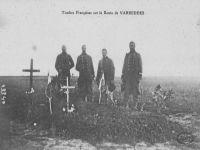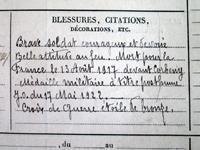Archives
Construct the history of a World War I soldier

The First World War is a recent enough event for family papers to provide the first pieces of information about the career of a soldier. It is not uncommon to find :
- civil registry documents (birth, death, marriage) containing detailed information about family name, different names (in order), date and place of birth of the searched for soldier ;
- letters, diaries, postcards, photographs, memoirs, decorations (Military Medal, Croix de Guerre, Legion of Honour) so that soldier's fate can be partially retraced ;
- the military booklet of the soldier revealing his whole career, starting with the number of his unit and his different assignments and years of service.
To find a soldier who died during WWI, the search should start by consulting the database of the Mémoire des Hommes website :
This database contains the records of more than 1.3 million soldiers who died during the Great War and who received the mention "Mort pour la France". Each record contains the following information: surname, name, place and date of birth and death, rank, corps, recruitment, corps and recruitment registration numbers, place and date of transcription of death certificate, manner of death.
This site is no use for soldiers who did not die during the conflict or for those who were executed by firing squad (except for rehabilitated combatants). It is then possible to search the database of war graves that does not include dead soldiers buried in national cemeteries or in municipal military graveyards :
The Mémoires des Hommes website also provides a database of all pilots in the period 1914-1918, whether or not they were killed in the conflict :
The Mémoires des Hommes website also offers Journals of Marches and Operations (JMO) for all units engaged during the First World War.

Held in the departmental archives sub-series 1R, these records - commonly known as recruitment registers - identify all men of the same class regardless of where they were assigned: infantry, engineers, cavalry, artillery, etc. Note that the officers' recruitment registers are kept at the Land Army History Service (SHAT) and those of the colonials at the Overseas Archives warehouse.
Each data sheet provides valuable information about each individual such as physical characteristics, successive home addresses, education level or medical information. It also details assignments, military campaigns or the conditions of death of the soldier. This is therefore the best way to find out the outline of the military career of the soldier in question.
Recruitment registers are openly accessible for the classes of 1912 to 1921 (Decree of 20 December 2012 on general exemption from Article L213.2 of the Heritage Code). Medical information is, however, blanked out for disclosures in the reading room for classes before 1912 and after 1921. To consult them, you must know the year of birth of the individual and add 20 years to find out his class (for example: a man born in 1895 is part of the class of 1915). In particular it is necessary to know his place of residence at the age of twenty in order to identify the recruiting office to which his municipality was attached. There were three recruitment offices in Seine-et-Marne :
- The Melun office
- The Coulommiers office
- The Fontainebleau office
For more information about the combats in which a soldier was involved, it is possible to consult the regimental history of the unit in which he served. The Departmental Archives of Seine-et-Marne only holds the histories of the following regiments :
- History of the 35th Territorial Infantry Regiment (AZ1114)
- History of the 32nd Field Artillery Regiment (AZ8476)
- Historical note on the 7th regiment of dragoons, Boufflers neighbourhood of Fontainebleau between 1913 and 1914 (MDZ806) ;
- Historical note on the 31st Territorial Infantry Regiment (MDZ1300). They can all also be viewed at the Army History Service (SHAT) at Vincennes or the International Contemporary Documentation Library (BDIC).
For even more precise knowledge of the places where a soldier fought, his unit’s journal of marches and operations should be consulted. This was a journal updated every day by an officer and was used to recount the various events that occurred in the unit throughout the war. It is therefore a key source of abundant information. Note: your ancestor will never be identified in the JMO of his unit except: if he was an officer, if he distinguished himself in an unusual manner or if he was killed or injured. The JMOs of all units engaged in the First World War are available on the Mémoire des Hommes website :
Consult the journals of marches and operations on the Mémoire des Hommes website
Sub-series 3R may contain documents that link with multiple agencies created at the end of the conflict. They assisted the reintegration of former combatants and the wounded into civil society and organized the payment of disability pensions or free medical care for conflict victims.
It is also possible to find information about a soldier in the combatant card requests files under shelf mark 3961W1 to 3961W36, and in the alphabetical departmental file of wards of the state under shelf mark 3962W1 to 3962W15.